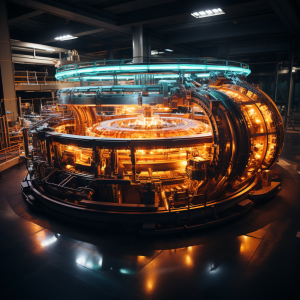Thermodynamics, as a branch of physics, deals with the study of heat, energy, and temperature in relation to the behavior of systems. In thermodynamics, a system can be defined as any portion of the universe that we choose to study. A system can be classified as open or closed based on whether or not it can exchange matter and energy with its surroundings.
A closed system, also known as an isolated system, is one that cannot exchange matter with its surroundings, but can exchange energy in the form of heat or work. For instance, a sealed container of gas is an example of a closed system. The amount of gas inside the container is fixed, but heat can be added or removed from the container, causing the temperature and pressure of the gas to change. Another example of a closed system is a piston-cylinder device, where the volume of the gas inside the cylinder is fixed, but heat can be added or removed from the system through the walls of the cylinder.
An open system, on the other hand, can exchange both energy and matter with its surroundings. In an open system, matter can enter or leave the system, and heat can be added or removed from the system, causing the temperature and pressure of the system to change. An example of an open system is a pot of boiling water on a stove. Water can enter or leave the system, and heat can be added or removed from the system through the walls of the pot, causing the temperature and pressure of the water to change.
The distinction between open and closed systems is vital in thermodynamics because it helps us understand how energy and matter flow through different systems. By studying the behavior of open and closed systems, we can make predictions about how they will respond to changes in their surroundings, and we can design systems to operate more efficiently. For example, understanding the difference between open and closed systems is important in designing power plants, where the efficiency of the system depends on how well it can convert energy from one form to another.
The main difference between open and closed systems in thermodynamics is that open systems can exchange both matter and energy with their surroundings, while closed systems can only exchange energy. By understanding the behavior of open and closed systems, we can design more efficient systems and predict how they will respond to changes in their environment. This knowledge is essential in the design and operation of various systems, from power plants to everyday appliances.
It is important to understand that the classification of a system as open or closed is not always straightforward, and there are cases where the distinction may be blurry. In some cases, a system may appear to be closed, but it can still exchange a small amount of matter with its surroundings. Similarly, some systems that appear to be open may have such a small exchange of matter with their surroundings that they can be treated as closed systems.
Another important concept in thermodynamics is the concept of a system boundary. The system boundary is a hypothetical line that separates the system from its surroundings. The boundary can be real, such as the walls of a container, or imaginary, such as a line drawn around a portion of a larger system. The boundary is important because it defines what is included in the system and what is not. The behavior of a system can only be studied with respect to its boundary, and the boundary must be carefully defined to ensure that the behavior of the system is properly understood.
In conclusion, understanding the difference between open and closed systems is a fundamental concept in thermodynamics. By understanding how energy and matter flow through different systems, we can design more efficient systems and predict how they will respond to changes in their environment. The concept of a system boundary is also important, as it defines what is included in the system and what is not. With a clear understanding of these concepts, we can make better decisions in the design and operation of various systems.




